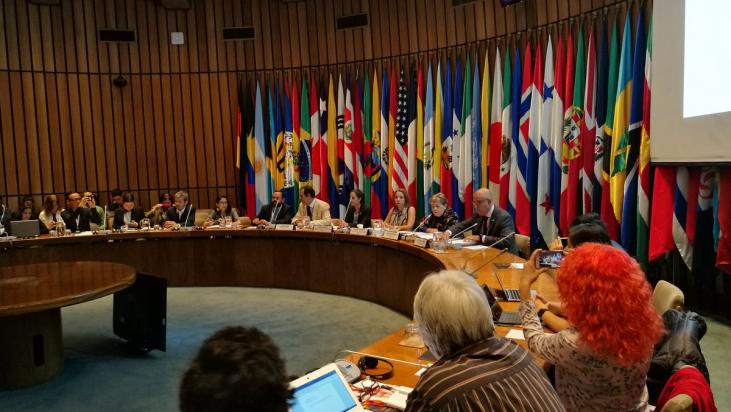During his participation in the Forum of the Countries of Latin America and the Caribbean on Sustainable Development, held in Santiago, Chile, Jorge Coronado, representative of Global Alliance for Tax Justice’s regional network member Red de Justicia Fiscal de América Latina y el Caribe, presented the “Continental Political and Social Policy Agenda for Justice in International Taxation” (“Agenda Político Social Continental por Justicia en Fiscalidad Internacional”).
As introduction, Coronado highlighted “the points that civil society has in common with the Economic Commission for Latin America and the Caribbean” (ECLAC), in the analysis of the region and explained how in recent years, “development aid” has been replaced by the “financing for development” vocabulary: “What has happened is that the rich North is disregarding its responsibility to have created a poor South”, Coronado says. He also criticized the current tax system of most countries in the region, where the regressive schemes make those who have less pay the most. “The regressivity (of the taxes) is event more accentuated because in our countries, we have either none or very low wealth, rent and capital gains tax levels. In Latin America, those who pay more taxes are those who have the least. And if we add to that the tax fraud, illicit financial flows (which in 80% of the cases have their origin in commercial activities)…”
Coronado, former president of Latindadd, also explained that the region does have the necessary resources to finance the 2030 Agenda and the Sustainable Development Goals, since he explained that these resources are in the billions of dollars that countries fail to collect as a result of the tax fraud. “Each year we loose more than US $ 10 billion in tax payments, according to reserved estimates. Only in 2012, more than US $ 140 billion came out of Latin America as capital flight. So, there are resources… but this is a discussion that the elites of economic power are not interested in. We are on the verge of a tsunami of social unrest in the region if this logic is not reversed. It is time for governments to stop thinking about economic and fiscal policies for the benefit of the elites, as it is until now”.
Find below a translation of the “Continental Political and Social Policy Agenda for Justice in International Taxation” presented by Jorge Coronado (here in Spanish):
Fiscal control of Transnational Corporations:
- Public Coutrny by Country Reporting (CBCR) where they operate.
- Public Records of Final Beneficiaries.
- Automatic Exchange of Information
Combat Tax Global Opacity:
- Economic sanctions to the Tax Haven Network
- Elimination of bank secrecy and tax reserve for large national and / or transnational investment.
- Prohibit the business forms of so-called offshore companies.
Taxation for inclusion:
- Tax progressivity in the national reforms with the purpose of raising the regional tax pressure to 20 percent as a base.
- Accentuate direct tax progressiveness: income, profits and wealth.
- Stopping the “race to the bottom” approach in public policies on investment attraction.
- Eradicate fiscal privileges for large national and transnational investment.
- Adopt the approach of cooperation and financial integration in public tax policies.
- Strengthen the mechanisms of transparency, efficiency, control, control and quality of social spending.
End the transnational corporate control over the global governance of taxation:
- Question the hegemony of the G-20 and the OECD in the conduct of the international tax reform.
- Promote the role of the G-77 as an actor in the reform of international taxation.
- Promote the creation of a binding Intergovernmental Body on International Taxation within the framework of the General Assembly of the United Nations Organization.
Incorporate the topic of Tax Justice into the social movement’s agenda
- With the trade union movement, tax justice for social protection, universal and sustainable public services.
- With the indigenous and peasant movement, tax justice in the use of land and the defense of the territory.
- With the political movement with national representation, tax justice in the regulation of investment.
- With the women’s movement, fiscal justice for gender equality, ethnicity, social class, intergenerational and sexuality.
